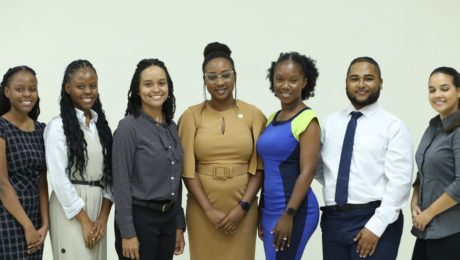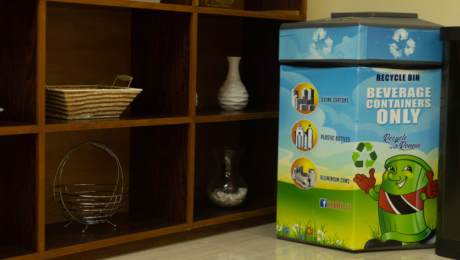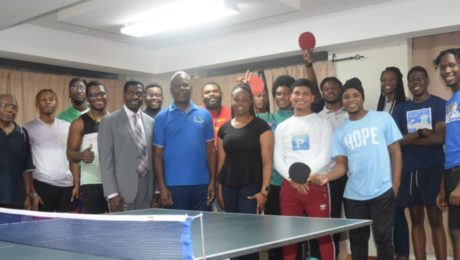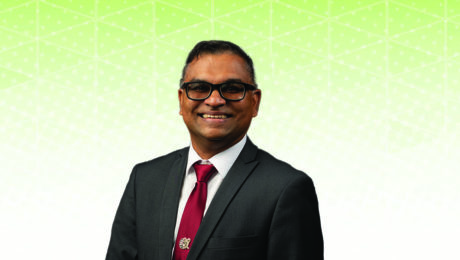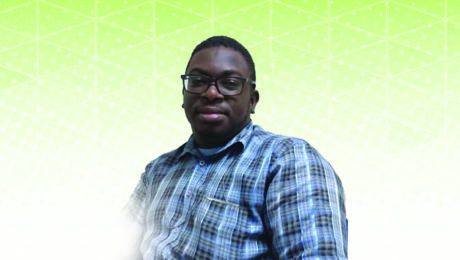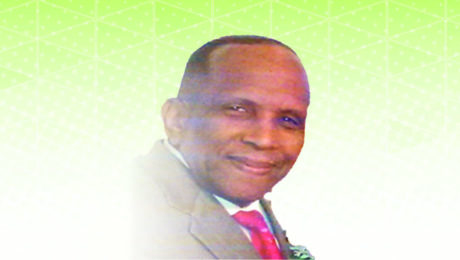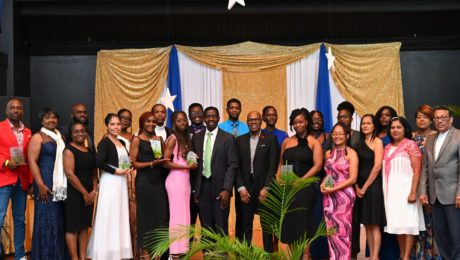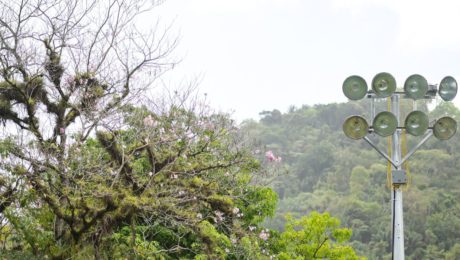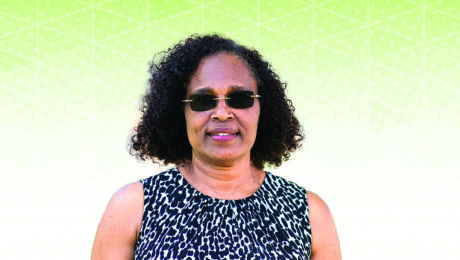USC Hosts Occupational Therapy Scholar Day 2024: A Celebration of Research and Achievement
By Ms. Kimarah Reefe, Director, Occupational Therapy (Ag.) & Ms. Simone Augustus, Corporate Communications Officer
On Monday, April 8, 2024, the University of the Southern Caribbean (USC) held its annual Occupational Therapy Scholar Day, an event that showcased the innovative research and celebrated the remarkable achievements of the graduating Master of Science in Occupational Therapy (MSOT) students. This distinguished event underscored the dedication, hard work, and scholarly contributions within the field of occupational therapy.
The day’s proceedings were masterfully guided by Dr. Ronnie Roberts, the Graduate Studies Coordinator, who served as the Master of Ceremony. Dr. Roberts ensured that the event ran smoothly and engagingly, setting an inspiring tone for a day of intellectual exchange and celebration. The event commenced with opening remarks by Ms. Kimarah Reefe, the Acting Director of the MSOT program. Ms. Reefe lauded the students’ hard work and dedication, highlighting the significance of their research in advancing occupational therapy.
Following Ms. Reefe’s address, USC President Dr. Colwick Wilson and Provost Dr. Len Archer extended a warm welcome to all attendees. Both Dr. Wilson and Dr. Archer emphasized the importance of research and scholarship in occupational therapy, commending the students and faculty for their invaluable contributions. Dr. Lena Caesar, Dean of Graduate Studies and Vice Provost, introduced the keynote speaker, setting the stage for an enlightening address by the Honorable Senator Dr. Paul Richards.

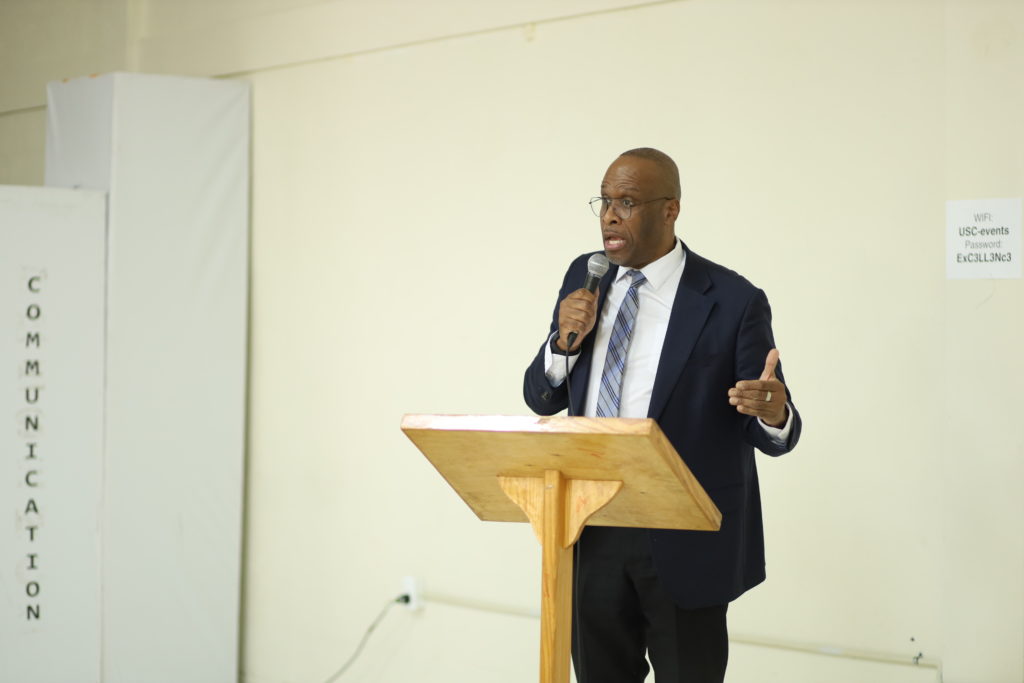
Dr. Richards delivered a compelling keynote address titled “Factors that Contribute to Life Satisfaction of Parents of Children with Autism Spectrum Disorder in Trinidad & Tobago.” His speech delved into the unique challenges and rewards faced by parents of children with autism, offering profound insights into the socio-cultural dynamics at play and suggesting holistic approaches to support these parents.
The core of the program featured a series of research presentations by the MSOT students, reflecting the depth and diversity of their studies. The first presentation, by Ms. Lynthea Reefe and Mr. Mikkel Wilson, focused on “The Impact of Chronic Pain on Social Participation in Adults in Trinidad and Tobago: A Mixed Methods Study.” Their research highlighted the significant challenges faced by adults with chronic pain in Trinidad and Tobago, exploring various coping strategies and healthcare interventions.
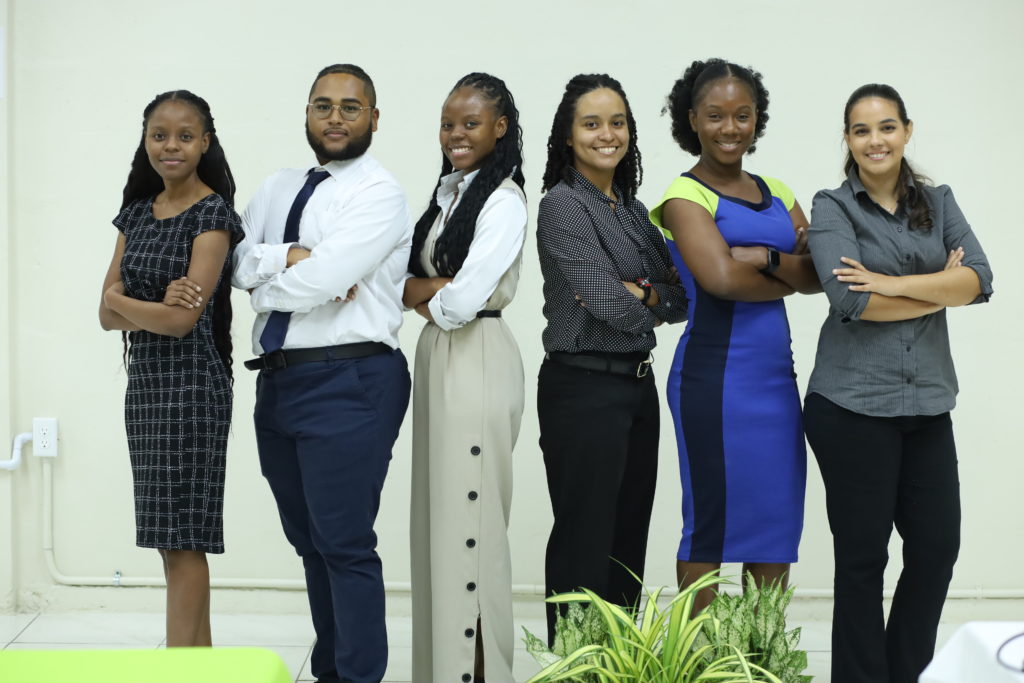
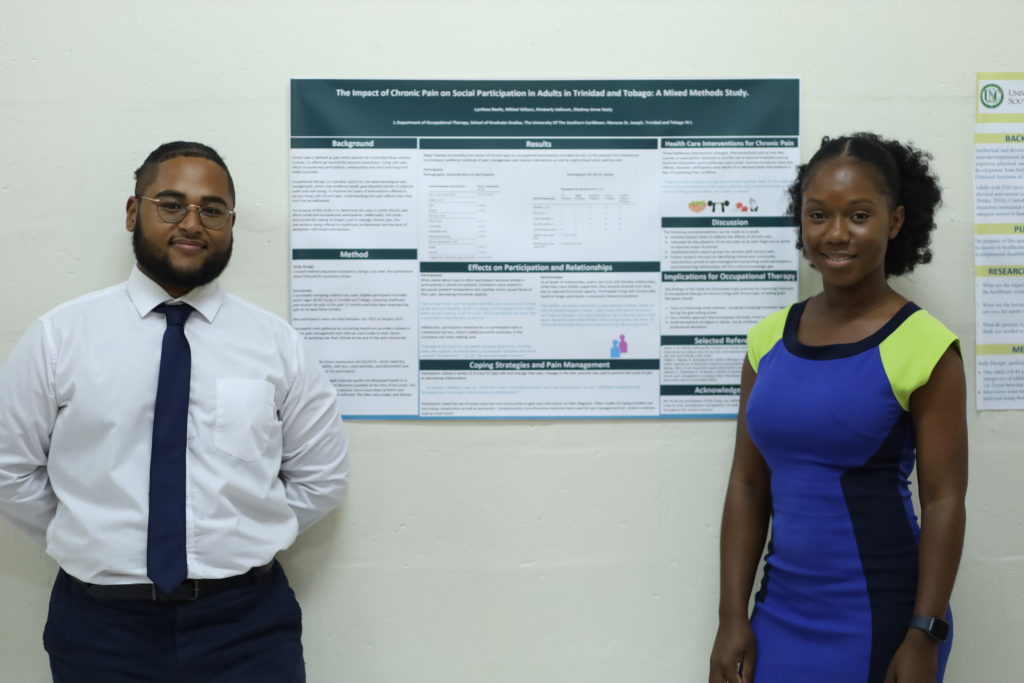
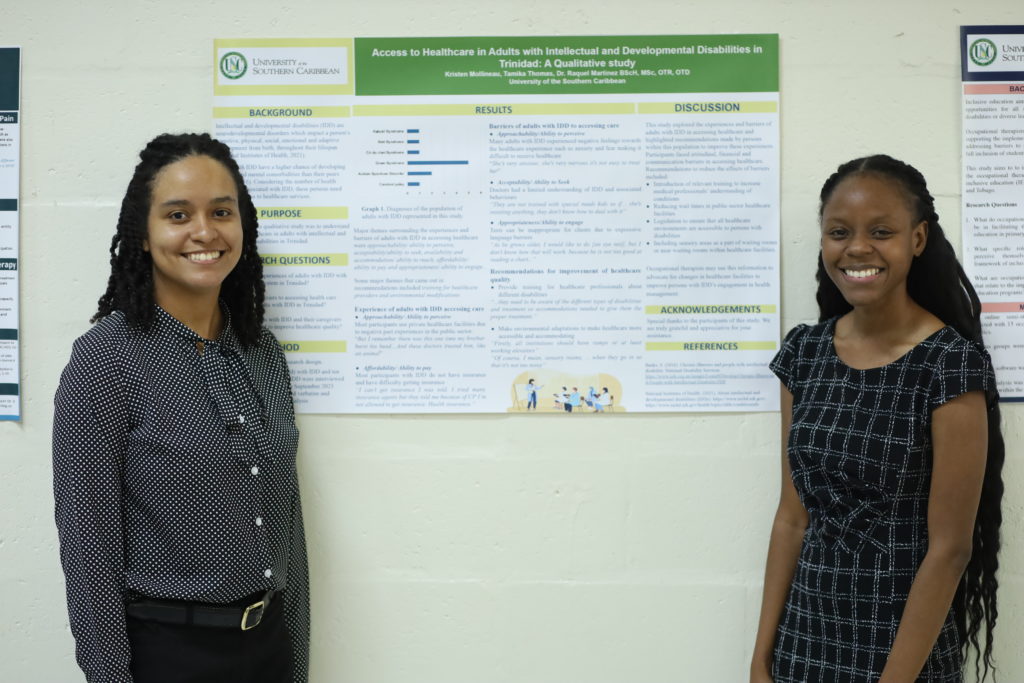

The second presentation, by Ms. Kristen Mollineau and Ms. Tamika Thomas, examined “Access to Healthcare in Adults with Intellectual and Developmental Disabilities in Trinidad: A Qualitative Study.” Their research addressed the barriers these individuals face in accessing adequate healthcare and provided recommendations for improving healthcare services.
The final student presentation, by Ms. Chelsea Walcott and Ms. Aneka Thomas, explored “Perceptions of Local Occupational Therapists on Their Potential Role in Inclusive Education in Trinidad and Tobago.” Their study revealed the potential contributions of occupational therapists in shaping inclusive education policies and practices in Trinidad and Tobago.
The event concluded with closing remarks from Dr. Diadrey-Ann Sealy, Research Professor. Dr. Sealy reflected on the day’s events, emphasizing the importance of continued research and collaboration in occupational therapy. She celebrated the dedication and success of the MSOT graduating students, acknowledging their scholarly journey over the past three years.
Occupational Therapy Scholar Day 2024 was not only a platform for showcasing research but also a celebration of the dedication and scholarly achievements of USC’s MSOT students. The event highlighted the critical role of research in advancing the field of occupational therapy and underscored the importance of continued academic and professional growth.
- Published in News, President's Newsletter
University of the Southern Caribbean Launches New Recycling Initiative: iCARE
By Simone Augustus, Corporate Communications Officer
On May 3, 2024, the University of the Southern Caribbean (USC) announced the launch of its Recyclable Solid Waste Collection Project, known as iCARE, with the introduction of new recycling bins across its Main Campus. This initiative marks a significant step towards promoting environmental stewardship within the university community.
The iCARE project is designed to encourage proper waste management and recycling practices among students, faculty, and staff. The newly installed bins are strategically placed around the campus to facilitate easy and convenient disposal of recyclable materials. These bins are designated for specific types of post-consumer beverage containers, including plastic (PET/Type 1) bottles, drink cartons, aluminum cans, and glass bottles.
The implementation of the iCARE project reflects USC’s ongoing commitment to sustainability. The university community is urged to actively participate in this initiative. By utilizing the recycling bins, members of USC can contribute to reducing waste, conserving natural resources, and promoting a cleaner, greener environment.
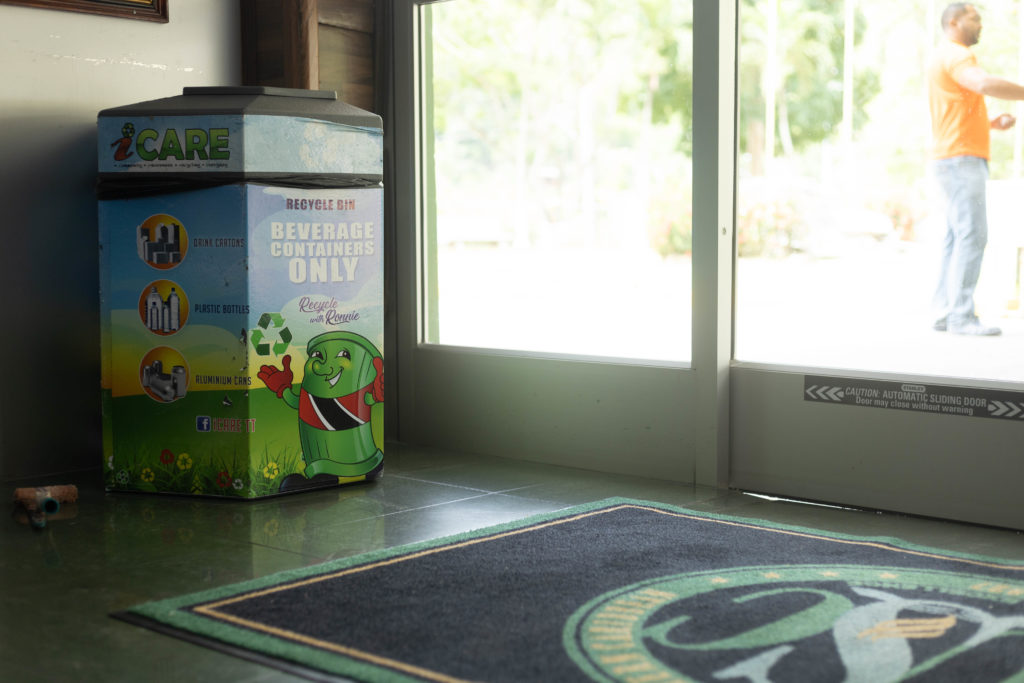
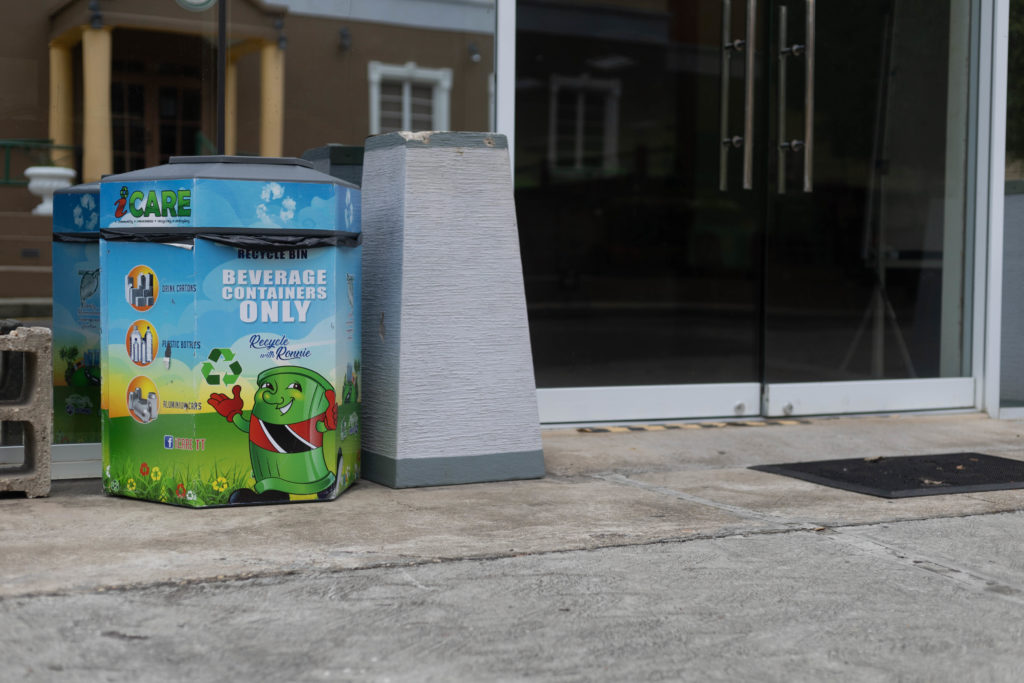
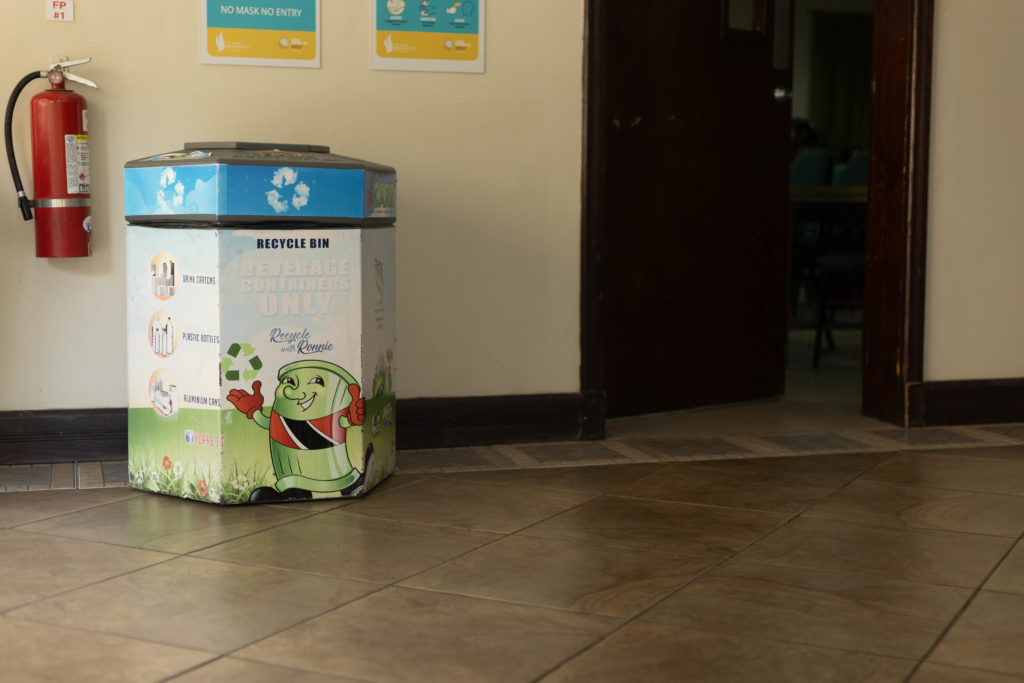
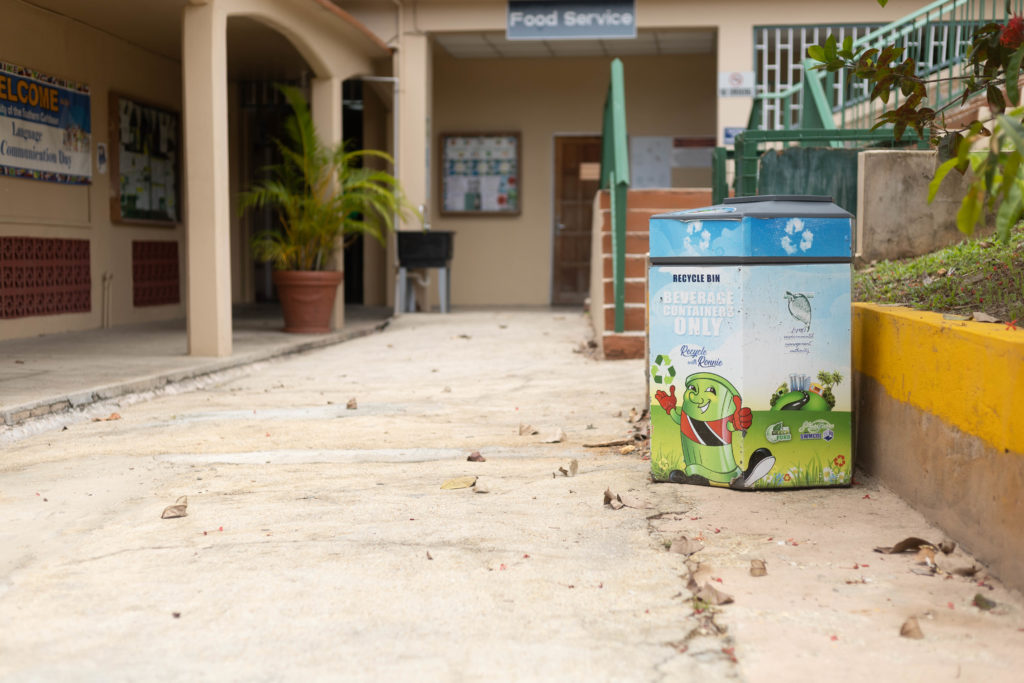
Dr. Colwick Wilson, President of USC emphasized the importance of collective action in making a positive impact. “Every small action counts. When we all do our part by properly sorting and disposing of recyclables, we can significantly reduce the amount of waste that ends up in landfills. Together, we can make a difference and contribute to a more sustainable future for generations to come.”
The introduction of the iCARE project aligns with USC’s broader environmental goals, which include reducing the university’s carbon footprint and promoting sustainable practices across all campus operations. The initiative also serves as an educational tool, raising awareness about the importance of recycling and sustainability among the university’s population.
Members of staff have expressed their support for the new initiative. Dr. Gersha Pierre, Director of Quality Assurance expressed her support this way: “ As the Director of Quality Assurance, I am delighted to endorse USC’s new recycling initiative aimed at promoting environmental stewardship across our campus. By implementing and maintaining recycling bins for plastic bottles, we are taking a significant step towards reducing our ecological footprint and fostering a culture of sustainability. This initiative not only aligns with our commitment to environmental responsibility but also embodies the principles of quality assurance through systematic process improvement and stakeholder engagement. I am even more excited by the fact that for Quality Week 2023, the first place student entry in the Brilliant Ideas competition, Ms Ann -Marie Duncan, focused on the use of recycling bins on the campus and its benefits. Congratulations to her and to the USC Administration. Great minds really do think alike”.
The University of the Southern Caribbean invites everyone on campus to embrace this new initiative and work together towards a more sustainable future. With active participation and continued efforts, USC hopes to lead by example in environmental stewardship and inspire other institutions to follow suit.
- Published in News, President's Newsletter
The Dr. Kern Tobias Table Tennis Competition: A Celebration of Community and Sport
By Mr. Vayani Toney & Ms. Simone Augustus, Corporate Communications Officer
The Timothy Greaves Residence Hall community recently celebrated the success of the Dr. Kern Tobias Table Tennis Competition, a newly established event that marked its inaugural run with a blend of enthusiasm, camaraderie, and impressive skill. The competition, spearheaded by Vayani Toney, former Associated Student Body President (2022-2023), was envisioned as a means to strengthen dormitory community engagement and enhance recreational opportunities for residents, especially those passionate about table tennis.
The genesis of this event can be traced back to Toney’s observation of the growing interest in table tennis among both male and female residents. Following discussions with Dr. Kern Tobias and Dr. Colwick Wilson, the concept began to take shape. With the collaborative efforts of the then Men’s Club President, Mr. Delbert Defoe, and his executive team, the competition was meticulously planned and executed over the span of a week, culminating on December 8th, 2022.
The inaugural competition featured a robust roster of talented players, including Jamol Pompey, Reynold Williams, Aubrey Gill, Jad Isidore, Asahel Joseph, Joash Prowell, Jesse Schultz, Akinpelu Williams, Jasiel Toppin, Khadoni Webster, Aziel Hoyte, Ronaldo Stoby, Isaac Patterson, and Jean-Paul Milard. Each player brought their unique flair to the table, turning the event into a thrilling showcase of sportsmanship and skill.
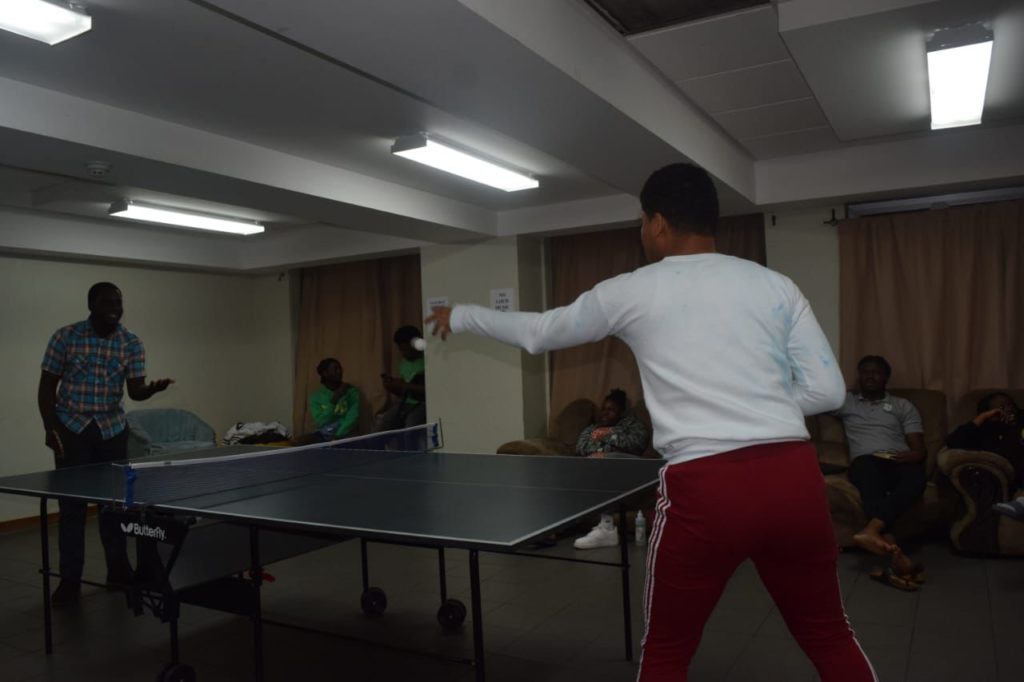
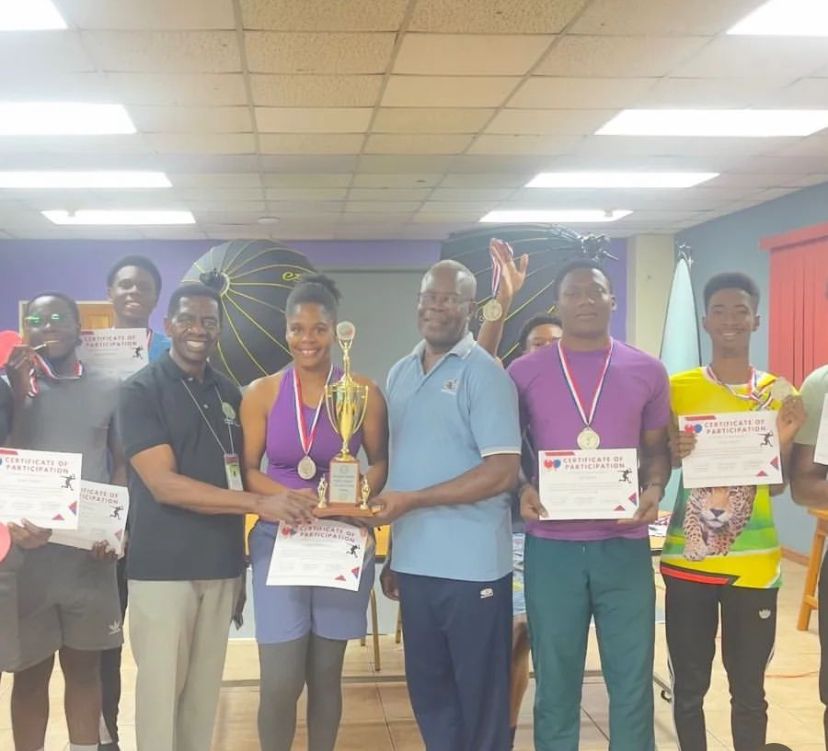

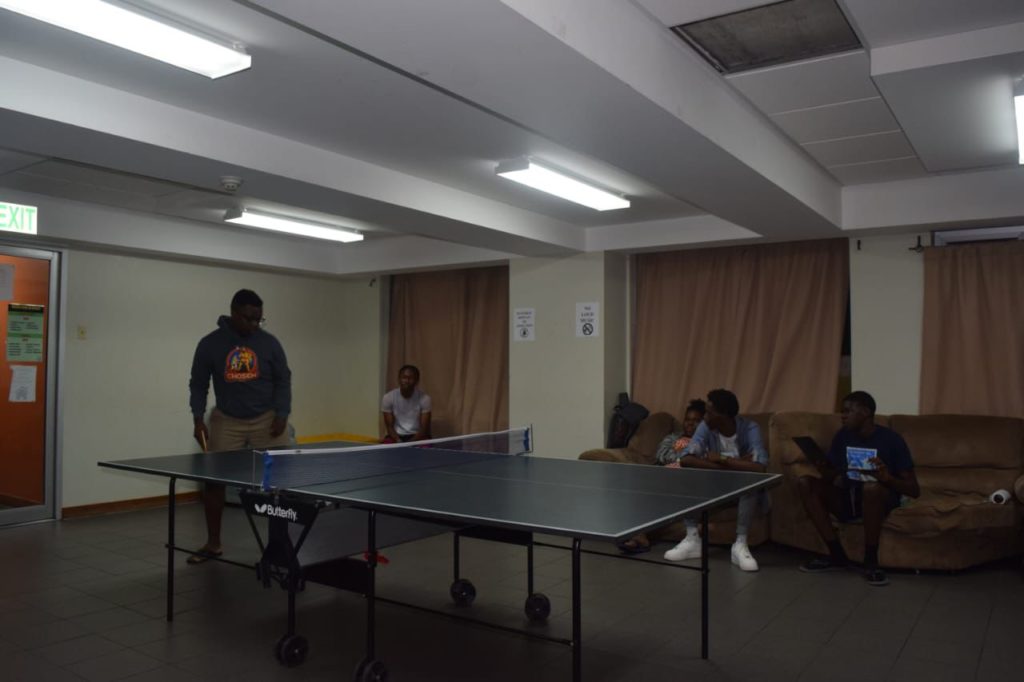
In the gripping finale, Reynold Williams emerged as the champion, while Aubrey Gill earned the title of Most Valuable Player (MVP) for his exceptional performance and sportsmanship throughout the competition. The event’s success was bolstered by the generous support of sponsors, including Dr. Colwick Wilson, Dr. Kern Tobias, and The Associated Student Body, who provided gifts and prizes for all participants.
The overwhelming positive feedback from the inaugural event led to the announcement that the Dr. Kern Tobias Table Tennis Competition would become an annual tradition, promising future installments filled with excitement and friendly rivalry.
Following a brief hiatus, the second edition of the Dr. Kern Tobias Table Tennis Competition took place from April 11-29, 2024. The event was led by Mr. Jad Isidore, President of the Men’s Club for the 2023-2024 academic year, alongside Mr. Vayani Toney, now serving as the Men’s Club Advisor. This iteration of the competition saw increased interest, with the notable inclusion of the competition’s first female contender, an off-campus resident, adding to the excitement.
The competition featured both seasoned players and fresh talent, with participants such as Jad Isidore, Jesse Shultz, Ethan Leon, Marrio Whyte, Jamol Pompey, Reynold Williams, Latoya Emmanuelson, Reyniel Williams, Nkosi Cato, Lorenzo Constantine, Asahel Joseph, Kahlan Roach, and Akinpleu Williams. In a thrilling conclusion, Ms. Latoya Emmanuelson claimed the championship trophy, making history as the first female winner of the competition. Mr. Jamol Pompey was honored with the MVP award, while Mr. Asahel Joseph received the Most Improved award for his remarkable progress.
Table tennis has solidified its place within the dormitory community, cherished for its blend of competitive spirit and camaraderie. Dr. Kern Tobias, a fervent supporter of such initiatives, has pledged ongoing support for future competitions. As anticipation builds for the 2024-2025 edition, the community looks forward to another exhilarating showcase of athletic prowess and sportsmanship, reinforcing the bonds of the Timothy Greaves community through the love of table tennis.
- Published in News, President's Newsletter
Student Spotlight: Nykhya Gardiner – Weaving Dreams into Reality at USC
By Ms. Simone Augustus, Corporate Communications Officer
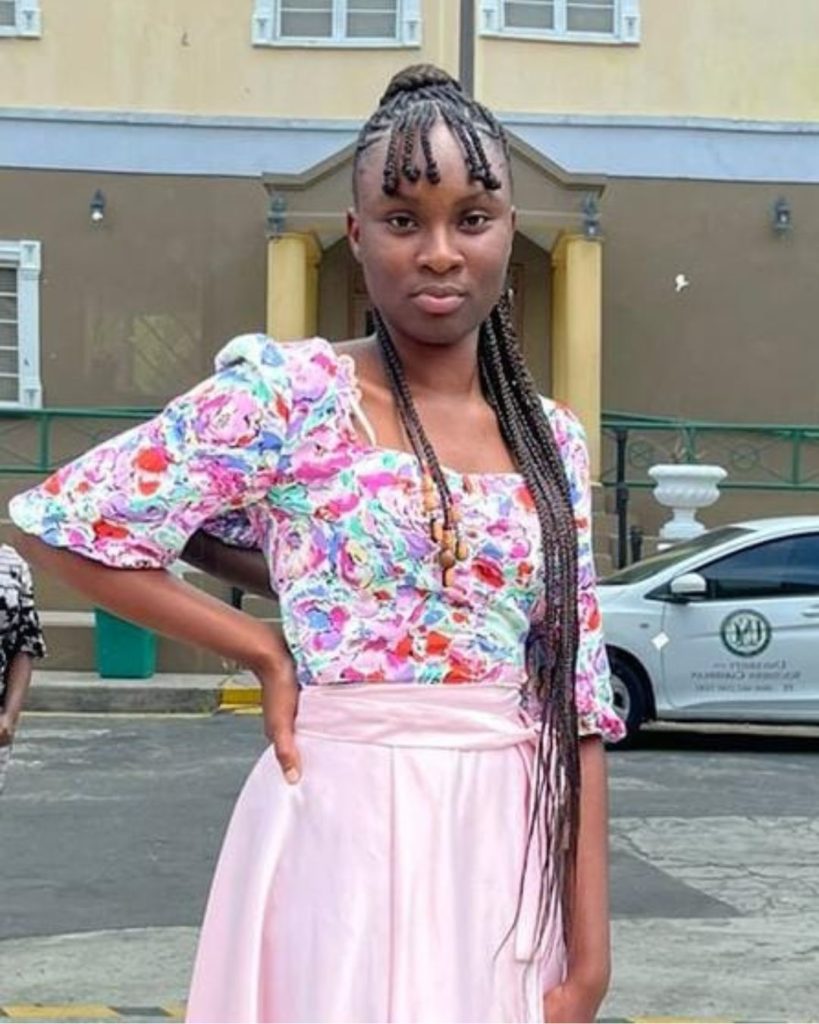
In the vibrant tapestry of student life at the University of the Southern Caribbean (USC), Nykhya Gardiner emerges as a shining thread, weaving together passion, perseverance, and purpose. A final year English major with a Communications emphasis, Nykhya hails from the picturesque island of Tobago. Her journey at USC has been one of self-discovery, growth, and unwavering dedication to both academic excellence and holistic development.
Pictured: Ms. Nykhya Gardiner
For Nykhya, pursuing higher education at USC was not just a personal ambition—it was a dream deeply rooted in her desire for a better future. Coming from a family where higher education opportunities were scarce, Nykhya saw education as a pathway to not only improve her own life but also to uplift her family. Despite USC not being her initial plan, Nykhya believes that divine intervention led her to this path, and she wholeheartedly embraces the journey paved by destiny, not coincidence.
Engaging in Campus Life: A Multifaceted Approach
For Nykhya, contributing to campus life isn’t just a duty; it’s a calling – she seeks to enrich the student experience and foster holistic development. From lending her melodious voice to the HIS LUV Choir to showcasing her athleticism on the USC Hummers Netball Team, Nykhya’s passion knows no bounds. As the incoming Sporting Director of the ASB for the New Academic Year 2024-2025, she’s poised to make even greater strides in campus leadership.
In the realm of leadership, Nykhya’s footprint is unmistakable. From planning events as a Student Representative to orchestrating the success of USC’s Got Talent as a Stage Manager, she exudes confidence and competence. Her dedication to fostering talent and community spirit shines through in every role she undertakes.
As a Student Representative for the School of Education and Humanities, she played a pivotal role in organizing events like Olympiad, demonstrating her organizational prowess. Her contributions as the Cultural Director for the Trinidad and Tobago Club have earned accolades, including first place in each category for International Students Week 2024.
Academic Excellence and Beyond
Nykhya’s inclusion on the Dean’s List for the Academic Year 2021-2022 speaks volumes to her dedication and diligence in pursuit of excellence. Beyond the classroom, her internship at USC’s Department of Integrated Marketing & Communications (IMC) allowed her to publish articles, honing her skills under the mentorship of seasoned professionals like Ms. Simone Augustus.
USC has been more than just an academic institution for Nykhya – it’s been a nurturing ground for personal and professional growth. From overcoming her introverted nature to honing her communication, leadership and event management skills, Nykhya credits USC for helping her discover her true potential and embrace the future with confidence.
As she charts on her post-graduation journey, her career aspirations are diverse yet rooted in her passion for event planning and management. While her initial plan was to delve into Public Relations, she remains open to the possibilities that life may unfold. Armed with a wealth of experiences and skills gained at USC, she’s poised to make a lasting impact wherever life takes her.
Words of Wisdom for Fellow Scholars
Nykhya’s journey is a testament to the transformative power of higher education and campus involvement. Her advice to fellow students is simple yet profound: embrace the college experience, stay open to learning, and have faith in yourself and your journey.
In the whirlwind of academic pursuits, extracurricular activities, and personal growth, Nykhya acknowledges the challenges of balancing it all. Her advice? Take it one step at a time, be kind to yourself, and embrace the journey, uncertainties and all.
As Nykhya Gardiner prepares to leave her mark on USC and step into the wider world beyond its campus borders, she stands as a beacon of inspiration—a testament to the transformative power of education, passion, and unwavering determination. As she continues to leave her mark on campus and beyond, her legacy will undoubtedly inspire generations to come.
- Published in News, President's Newsletter, Students
Faculty Spotlight: Dr. Dave V. Cassie – Unveiling the Innovator
By Ms. Simone Augustus, Corporate Communications Officer
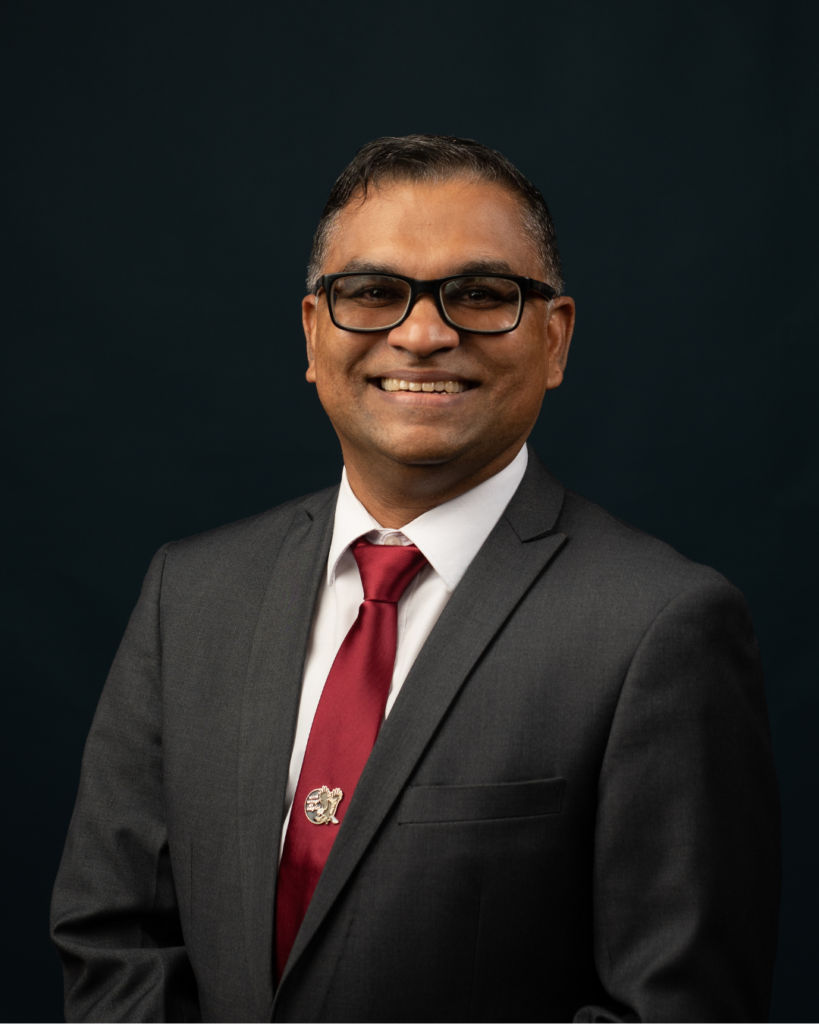
Meet Dr. Dave V. Cassie, a dedicated and innovative Assistant Professor in the Department of Biological Sciences at the University of the Southern Caribbean’s (USC) School of Science, Technology & Allied Health. With an impressive 14-year tenure at USC, Dr. Cassie has continually pushed the boundaries of science education, fostering a dynamic and engaging learning environment for his students.
Pictured: Dr. Dave V. Cassie
Academic Journey and Expertise
Dr. Cassie’s academic journey is a testament to his dedication and passion for science and education. He holds a Doctor of Education (EdD) in Educational Leadership in Higher Education from the University of the West Indies Open Campus (2015-2020). Prior to that, he earned a Master of Philosophy (MPhil) in Chemistry (Research) and a Bachelor of Science (BSc) in Chemistry/Analytical Chemistry with First Class Honors from the University of the West Indies, St. Augustine, Trinidad.
His extensive background in chemistry and educational leadership has equipped him with the expertise to lead innovative teaching methods and contribute significantly to the academic community.
Pioneering Teaching Methods
A strong advocate for online learning, Dr. Cassie integrates science simulations and digital/Smartbooks into his curriculum, making science education more accessible and interactive. His approach has been particularly impactful in the chemistry discipline, where traditional teaching methods often fall short. By incorporating these technologies, Dr. Cassie ensures his students receive a comprehensive and engaging learning experience.
Mentorship and Student Support
Dr. Cassie’s commitment to student success extends beyond the classroom. He actively mentors students through various programs, including the AERA Researcher Development Program and the Global Banking School Professional Mentoring Programme. His role as a mentor has positively influenced numerous students, including Shawn Walsh, an EdS Candidate at Concordia University, and Dragos Sapunaru from the UK.
As a graduate student supervisor and an active member of the School of Graduate Studies & Research, Dr. Cassie provides invaluable guidance to aspiring researchers, ensuring they have the support and resources needed to thrive academically and professionally.
Research Contributions
Dr. Cassie’s research interests are as diverse as they are impactful. His ongoing projects include examining the attitudes of elementary school leaders towards artificial intelligence in classrooms and exploring e-leadership approaches in post-COVID-19 science teaching. His forthcoming publications, such as “Diversifying Science Teaching in the post COVID-19 era: an e-leadership approach” and “Virtual science simulations: The new frontier in science instruction in the post-pandemic Caribbean,” highlight his commitment to advancing science education.
Dr. Cassie’s extensive body of work also includes studies on COVID-19 vaccine hesitancy and the challenges of online chemistry learning in the Caribbean. His research not only addresses current educational challenges but also offers practical solutions to enhance the learning experience.
Leadership and Service
Throughout his career at USC, Dr. Cassie has held several key leadership positions, including Chair of the Department of Chemical & Physical Sciences and Chair of the Examination Council. He has actively participated in numerous committees, contributing to the strategic planning and quality assurance efforts at the university. His role as Co-chair of the Program for the USC Research Conference 2024 and his involvement in organizing events like the USC Virtual Research Day 2021 demonstrate his dedication to fostering a vibrant academic community.
Recognized for Excellence
Dr. Cassie’s contributions to science education have not gone unnoticed. He’s been honored with prestigious awards like the 2021 Labster Teacher of Year STEM Excellence Award and the Rafael Douglass Award for Excellence in Science Teaching. His contributions have earned recognition from esteemed organizations and institutions, further solidifying his impact on the academic community.
Vision for the Future
Looking ahead, Dr. Cassie envisions a future where science education is continuously enhanced through the integration of new technologies and innovative teaching methods ensuring that students remain engaged and empowered. His vision for the department and field is one of innovation, progress, and inclusivity. He advocates for a move away from pre-COVID-19 teaching methodologies, emphasizing the importance of keeping education dynamic and student-centered.
In Dr. Dave V. Cassie, USC has not just an educator but a true trailblazer—a scholar, mentor, and leader who’s shaping the future of science education one innovation at a time. As he continues to inspire, educate, and lead, his legacy will undoubtedly leave an indelible mark on USC and the world of academia. His dedication to enhancing the learning experience at USC and his forward-thinking approach to science education make him a true asset to the university.
- Published in Faculty, News, President's Newsletter
Staff Spotlight: Mr. Taurean Joseph – A Pillar of Financial Guidance at USC
By Ms. Simone Augustus, Corporate Communications Officer

For over sixteen years, Mr. Taurean Joseph has been an invaluable asset to the University of the Southern Caribbean (USC). As an Accounting Assistant in USC’s Department of Student Finance, Taurean has consistently demonstrated a commitment to excellence and student success. His role extends beyond mere numbers; he is a trusted financial advisor, a diligent liaison, and a compassionate supporter of students’ academic journeys.
Pictured: Mr. Taurean Joseph
Holding an ACCA Level 1 qualification and currently pursuing a BSc in Computing with an emphasis on Information Systems, this blend of financial and technological expertise enhances Taurean’s ability to provide comprehensive support to students.
A Trusted Financial Advisor and Liaison
In his capacity as a financial advisor, Taurean specializes in assisting students from the School of Social Sciences across all USC campuses in Trinidad and Tobago, including the Main, South, and Tobago campuses. He bridges the gap between USC and the Government Assistance for Tuition Expenses Programme (GATE), ensuring seamless communication and support for the students.
Taurean’s role is multifaceted, encompassing account reconciliation, approval processes for transcripts and diplomas, and the execution of payment plans tailored to individual needs. He is instrumental in critical projects like graduation clearance and GATE submissions, facilitating a smooth transition for students as they advance in their academic pursuits.
Achievements and Recognition
Throughout his tenure at USC, Taurean has accumulated a wealth of experiences that shape his approach to student finance. His dual roles in Student Finance and as a shuttle driver in Student Services have provided him with a deep understanding of the student experience. This unique perspective allows him to deliver exceptional customer service, assisting countless students in reconciling their accounts and progressing academically. Recognized with service awards and a special thank you token from Dr. Edward Clarke, former Dean of the School of Social Sciences, Taurean’s contributions are widely acknowledged and appreciated.
Enhancing Student Experience
Taurean’s conscientious attitude and strong relationships within the student body have made a significant impact within the USC community. He is known for ensuring that financial constraints do not hinder students’ academic progress. His proactive approach and empathetic listening make him a reliable figure for both students and colleagues.
Taurean’s professional philosophy is deeply rooted in empathy and perseverance. Guided by the principle from Matthew 7:12, “In everything, do unto others what you would have be done to you,” he treats every student with equal respect and consideration. As a working student himself, he has a unique perspective on the challenges faced by students. Additionally, he draws inspiration from Francis of Assisi’s words, “Start by doing what’s necessary; then do what’s possible; and suddenly you are doing the impossible,” reflecting his commitment to overcoming obstacles and helping students achieve their academic dreams.
Making a Difference
Taurean Joseph embodies the spirit of USC through his unwavering dedication to student success. His role is not just a job but a mission to enhance the student experience and support their academic journeys. We are proud to have Taurean as part of the USC family, continually inspiring and assisting our students with his remarkable service and commitment.
- Published in News, President's Newsletter, Staff
Alumni Spotlight: Col. José Thomas-Richards (Ret.) – A Journey of Transformation and Triumph
By Ms. Simone Augustus, Corporate Communications Officer
From Venezuela to CUC: A Life-Changing Transition
In 1958, a young José Thomas-Richards arrived at the Caribbean Union College (CUC) in Form Three. Born in Ciudad Bolívar, Venezuela, José spoke Spanish as his native tongue and found himself in a new environment where English would become an essential part of his life.

Recounting his arrival, he shares, “My transition to CUC was a pivotal moment. It enhanced my diction in English and set the foundation for my future.”
José’s journey to CUC was sparked by his father’s chauffeur, who recommended the unique boarding school known for its stringent educational standards and emphasis on Christian values. José’s father, a petroleum engineer in Trinidad, heeded this advice, believing CUC could provide the structure his son needed.
Pictured: Col. José Thomas-Richards (Ret.)
A Transformation of Faith
Initially, José was no stranger to mischief and poor academic performance. From the bustling streets of Port of Spain to the tranquil grounds of CUC, José’s initial reaction to his new school was one of rebellion. His days at his previous high school had been filled with dancing the meringue, donning jewelry, and partaking in activities frowned upon by the stricter standards of CUC.
José admits that he was privileged in that he never had to work throughout his academic career, as his father covered his tuition from CUC all the way through medical school. This financial support gave him a lot of free time, which he admits was not always used wisely. His room leader often reminded him of Sister White’s teachings about the importance of work. Despite this, José and his friends, who were day students, often spent their free time going to the river. Yet, amidst this backdrop of teenage defiance, a significant change was on the horizon.
One of the most defining moments of José’s time at CUC was during a Week of Prayer led by Elder McEachrane. Initially, José found CUC’s tranquil atmosphere and Christian teachings to be far from “cool.” Coming from a background filled with social activities like dancing the merengue and wearing jewelry, the adjustment was challenging. However, during a Week of Prayer led by Elder McEachrane, José experienced a profound spiritual awakening. With tears streaming down his face, he accepted Christ and was baptized in the Maracas Valley River by President Percy Manuel. José humorously recalls slipping on a moss-covered stone during his baptism, pulling the pastor down with him. His friends jested about him “fighting with the devil,” but it was clear that a profound transformation had taken place.
He also credits Dean George Brown and Dr. Walter Douglas who were both instrumental and gave new meaning to Proverbs 24:3 “Through wisdom a house is built, and by understanding it is established; by knowledge the rooms are filled with all precious and pleasant riches”, which he achieved with God’s Grace.
Academic Pursuits and Professional Achievements
José graduated from CUC in 1962 with a high school diploma. He recalls being an unusual student, raised Catholic and unfamiliar with the Seventh-day Adventist lifestyle. His rowdy nature often got him into trouble, but one pivotal experience with Mrs. Kum, his English teacher, stands out. She strategically seated him next to Rosie Ward (now Dr. Rosie Ward), and when José received a distinction on the senior Cambridge exam, Rosie wryly remarked, “Even the devil knows scripture.”
At the behest of President Percy Manuel, José’s academic journey continued at Kingsway College in Canada, followed by Andrews University, and culminated in earning a degree in Osteopathic Medicine from the Kansas City University of Medicine and Biosciences in 1970. His dedication and excellence were recognized with numerous awards, including the Mead Johnson Award and the Star-Spangled Banner Medallion Award.
Distinguished Career & Contributions
Colonel Thomas-Richards’ career is a testament to his dedication and resilience. He served as Commander of the 948th Forward Surgical Team during Operation Enduring Freedom in Afghanistan, earning the Bronze Star for his leadership. His military service spanned 26 years, culminating in his retirement as a Senior Advisor of the United States Army Reserve Medical Corps, honored with the Legion of Merit.
As a medical professional, he completed an Orthopaedic residency and a fellowship in Hand Surgery, making significant contributions to the field. His accolades include the American Academy of Neurological and Orthopaedic Surgery and the American Board of Hand Surgery.
In addition to his military and medical careers, Colonel Thomas-Richards has been a passionate advocate for civil rights, serving as First Vice President of the NAACP and receiving multiple Humanitarian Awards. He continues to serve on the Board of Directors for The Area Agency on Aging in Palm Beach County.
Giving Back to the USC Community
Colonel Thomas-Richards’ commitment to giving back is evident through his involvement with the USC community. As a Board Member at Large for the North American Alumni Association, he continues to support and inspire the next generation.
This commitment is shared with his wife Mrs. Suzanne Thomas-Richards, who alongside Mrs. Claire Hosten, Mrs. Lorna Delancy, and Dr. Anester O. Shaw pioneered USC’s Thrift Store creating a self-sufficient initiative benefiting students and the community. The Thrift Store also provides a working lab for business students and supports the community through donated items.
Words of Wisdom & a Lasting Legacy
Now residing in Palm Beach, Florida, José continues to inspire others with his words of wisdom. He emphasizes the importance of humility, perseverance, and self-mastery. His advice to current students is profound: “Be proud and unbending in honest failure, yet humble and gentle in success. Never seek the path of comfort; learn to stand up in the storm, and demonstrate compassion on those who fail.”
Colonel José Thomas-Richards’ life is a testament to the power of transformation, faith, and education. From his rebellious teenage years to his distinguished career in medicine and the military, José’s journey is a shining example of how one can overcome adversity and achieve greatness. As he reflects on his life, he remains grateful for the foundation laid by his time at CUC, now USC, a place where he found his faith, his calling, and his path to success.
- Published in Alumni, News, President's Newsletter
SWAY 2024: Elevating Student Worker Excellence at USC
By Nadira Mohammed, Student Journalist
The La Joya sporting facility in St. Joseph was electrified with excitement and anticipation as the Student Worker Awards of the Year (SWAY) event unfolded. Themed “Elevating Excellence: Swaying in Performance,” this year’s SWAY, held on Sunday, April 28, 2024, was a spectacular showcase of talent, dedication and professionalism, masterfully orchestrated by Ms. Kichele Hernandez, ASB Director for Student Worker, and her dedicated subcommittee team.
Ms. Hernandez’s vision for SWAY was both inclusive and equitable, with the introduction of new award categories aimed at ensuring that every student worker’s achievements were duly recognized. Her opening remarks resonated deeply with the audience, emphasizing the value of acknowledging diverse skills and efforts.
The event featured mesmerizing performances by Ms. Shauntae Price and Ms. Ahjae Jackson, whose enchanting voices filled the air, accompanied by the captivating saxophone melodies of Mr. Jesse Schultz. Their performances added an extra layer of magic to an already enchanting evening.
The gala’s keynote speaker, Mr. Dominic Merritt, Dean of Men at USC, delivered a speech titled “Mindset to Mindshift: The Journey to Professionalism,” which captivated the audience with its inspirational words and profound insights. Dean Merritt celebrated the transformative power of student work, emphasizing its impact on individuals and communities alike. He commended the dedication and perseverance of student workers, urging them to embrace a mindset of professionalism and excellence.
Dean Merritt’s reflections on “SWAYing into Professionalism” underscored the importance of attitude in achieving greatness. He encouraged the audience to adopt a mindset rooted in faith rather than fear, urging them to pursue their goals with unwavering commitment and purpose. His speech served as a rallying cry for embracing new possibilities and redefining success on one’s own terms.
The highlight of the evening was the announcement of the award winners, each recognized for their outstanding contributions to the USC community:
– Academic Excellence: Edira Eugene
– Leadership Award: Julien Ferguson
– Rising Star: Allaire Johnson
– Above and Beyond: Michael Jagdharry
– Team Player: Kitwana Theophile
– Peak Performer: Joash Prowell
– All Round Consistency: Yiseth Guzman
– Most Improved: Suriel Gabriel
– Flexibility Award: Helen Cuffie
– Customer Service Representative: Alrine Peters
– Most Outstanding: Trinelle Straker
– Student Worker of the Year: Heidi Ann Cuffie
– Etiquette Award: Jounathan Peters
– Longest Worker: Shanessa Subagh
– Good Standing: Gregston Boyce
As the evening drew to a close, USC’s President, Dr. Colwick Wilson, expressed his gratitude to everyone in attendance for their unwavering support and dedication to fostering a culture of excellence at USC. Dr. Len Archer, USC’s Provost, echoed these sentiments, emphasizing the invaluable role that student workers play in shaping the institution’s character and achievements.
The SWAY event was not just a celebration of individual accomplishments but also a testament to the collective spirit of excellence and dedication that defines the USC community. As the curtain fell on another successful SWAY, it left behind a lasting impression of inspiration and admiration for the remarkable achievements of USC’s student workers.
State-of-the-Art Lighting Illuminates USC’s Playing Field
By Kadan Esson, Corporate Communications Assistant, & Simone Augustus, Corporate Communications Officer
The University of the Southern Caribbean (USC) has taken a significant stride in bolstering its playing field with the unveiling of newly installed state-of-the-art field lights. This enhancement marks a pivotal moment for both the university and the surrounding Maracas Valley community.
The USC playing field, serving as a focal point for sporting activities and community events, has long been a cherished asset for the university, the Maracas SDA Primary School, and residents of the Maracas Valley. From spirited cricket matches to exhilarating football games, the field has been the heart of competitive sports and leisure activities for all ages.
Under the auspices of the Sports and Physical Education Department (SPED), USC has cultivated successful sports teams spanning various disciplines including netball, football, volleyball, and cricket. These teams have consistently distinguished themselves in national, intervarsity, and club-level competitions, bringing pride to the university and its supporters.
However, the absence of adequate lighting had been a persistent challenge, limiting the field’s usability to daylight hours and curtailing evening training sessions, matches, and recreational activities. Recognizing the need for improvement, USC has now installed cutting-edge field lights, transforming the playing field into a dynamic venue capable of hosting night games, practices, and community events.

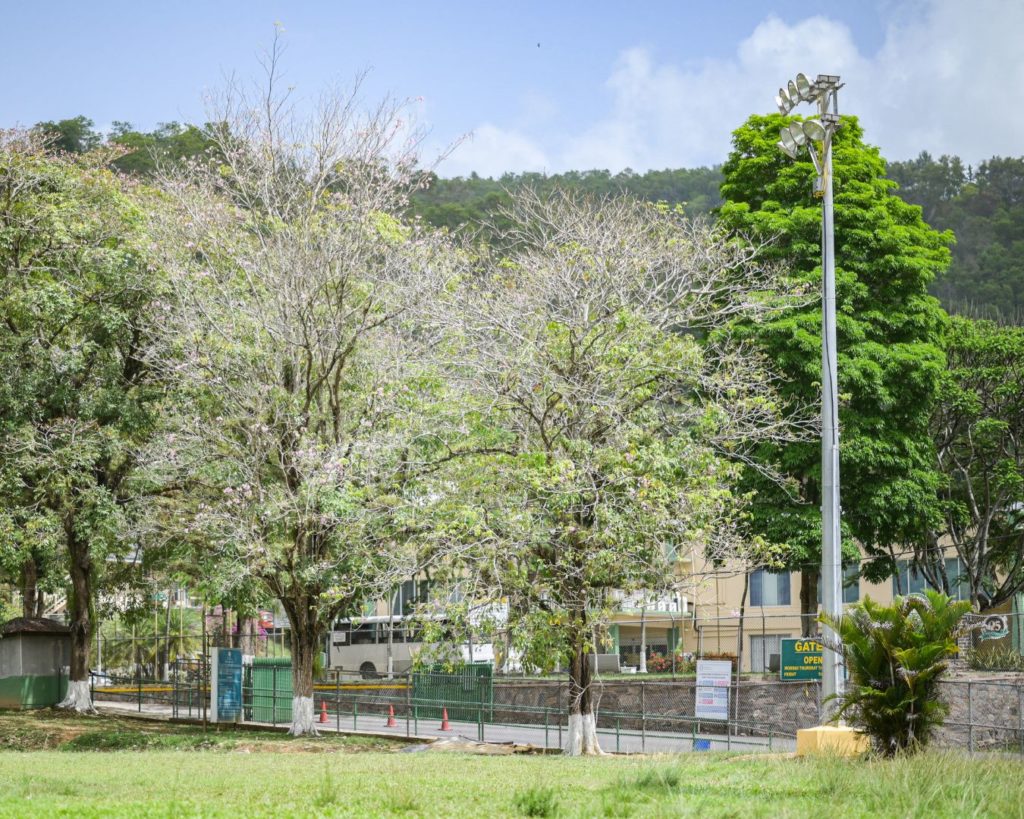
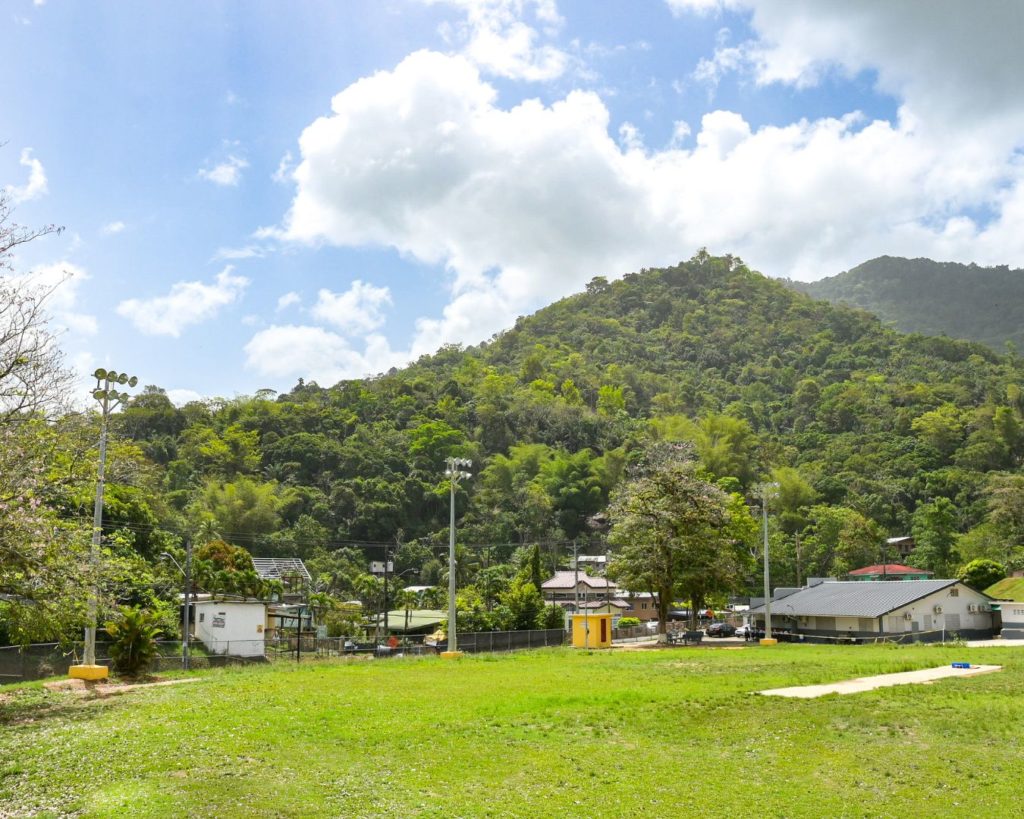
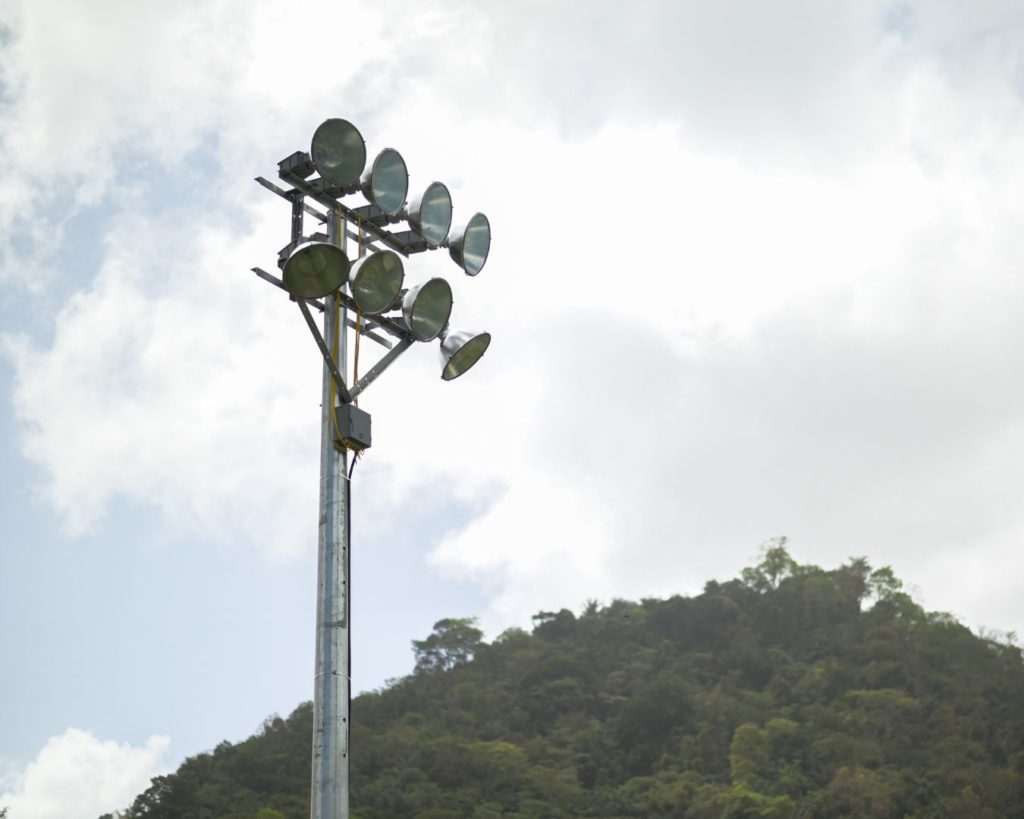
The introduction of field lights not only extends the operational hours but also ensures a safer environment for all users, fostering a vibrant atmosphere for sports enthusiasts and community members alike. This development aligns seamlessly with USC’s strategic goals of infrastructure development and campus beautification, solidifying the playing field as a cornerstone of activity and engagement.
As the lights illuminate the night sky over Maracas Valley, the University of the Southern Caribbean stands poised to embark on a new era of sporting excellence and community enrichment, ensuring that the playing field remains a beacon of opportunity and inclusion for generations to come.
- Published in News, President's Newsletter
Alumni Spotlight: Yvonne Telgt-McKinney, MD – Healing Hearts, Embracing Legacy
By Simone Augustus, Corporate Communications Officer
In the bustling heart of Southern California, amidst the palm trees and the shimmering sunshine, there’s a healer with a heart as big as the ocean and a spirit as resilient as the mountains. Dr. Yvonne Telgt-McKinney, a beacon of compassion and commitment, has been selected for the Alumni Spotlight in the April 2024 issue of the President’s newsletter. As her story unfolds, one can’t help but be drawn into the vivid tapestry of her journey, woven with threads of faith, resilience, and an unyielding dedication to service.
A Journey Rooted in Faith
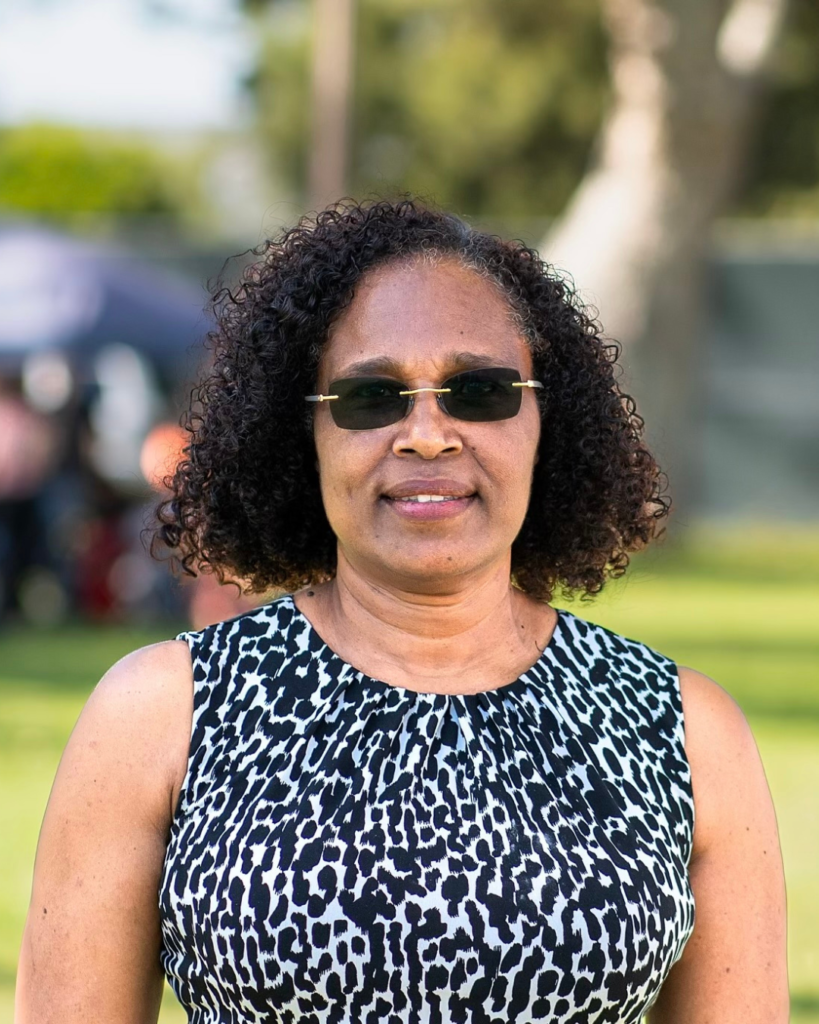
Travel back to the 1980’s, when Yvonne Telgt-McKinney embarked on her educational odyssey at Caribbean Union College (CUC). For her, attending CUC wasn’t just a decision; it was a testament to her family’s deep-rooted belief in Christian Education. Raised in a household where learning and faith intertwined seamlessly, Yvonne’s path was paved with purpose from the very beginning. “I did not initially want to go,” she admits with a chuckle, “but I also did not want to be poor in life.”
Pictured: Yvonne Telgt-McKinney, MD
At CUC, now known as the University of the Southern Caribbean (USC), Yvonne found more than just a campus; she found a family. Living in the dorms, she recalls the camaraderie that enveloped her like a warm embrace. “Everyone was like your big brother or big sister,” she reminisces. “We took care of each other; we just had a family spirit on the campus.”
Bamboo Cannons and Bonds That Last a Lifetime
Picture this: it’s a crisp evening, and the air crackles with anticipation. The ladies of Linda Austin Hall are tasked with announcing the banquet, an event steeped in tradition and pomp. But these spirited young women, fueled by a desire for drama and flair, hatch a plan that will go down in CUC history.
Enter Yvonne and her band of merry mischief-makers. With determination in their hearts and bamboo in hand, they embark on a daring escapade that will leave Cedar Hall trembling in its wake.
“We wanted to be more dramatic,” Yvonne recounts with a mischievous twinkle in her eye, “so we decided that we would ‘burst’ bamboo.” And so, with the help of her brother, who supplied the key ingredient for their audacious scheme, the stage is set for an unforgettable spectacle.
As the clock strikes midnight, a group of adventurous young women descends upon Cedar Hall, their hearts pounding with excitement and anticipation. Standing in the center of the hall, they unleash their bamboo cannon with a thunderous roar that shakes the very foundations of the building.
In an instant, chaos ensues. Men emerge from their rooms in a frenzy, brandishing makeshift weapons and bracing themselves for the unknown assailant. But as the dust settles and the laughter rings out, a collective sigh of relief sweeps through the hall.
“It was chaos!” Yvonne exclaims with glee, recalling the scene with vivid clarity. “But when they realized it was the girls, we all had a good laugh.”
A Life Devoted to Healing and Hope
Fast forward to the present, and Dr. Yvonne Telgt-McKinney stands as a pillar of strength and compassion in her community. As a medical doctor with a private practice in Southern California, she exemplifies the values instilled in her during her formative years at CUC.
“I take pride in serving the underserved,” she declares with unwavering conviction. From offering diabetes education classes to providing support for Alzheimer’s patients and their caretakers, Yvonne’s commitment to holistic healing knows no bounds. “No insurance or sponsors wanted to join,” she reflects, “but for the past 10 years, I am the only physician who offers such preventative measures.”
In a world enamored with titles and accolades, Yvonne Telgt-McKinney stands apart. For her, true fulfillment lies not in recognition, but in the lives she touches and the communities she serves. Whether it’s through her annual Christmas outreach drives or her steadfast dedication to her patients, Yvonne’s legacy is one of selflessness and sacrifice.
A Legacy of Giving Back
Yvonne’s journey from CUC alumna to esteemed medical practitioner has been punctuated by moments of reflection and gratitude. “I consider CUC as the ‘home base’ of my education,” she muses, her voice brimming with nostalgia. “This is the institution that contributed to what we wanted to be and where we are in life right now.”
When the opportunity arose to give back to her beloved alma mater, it was a no-brainer for Yvonne. Her significant contributions to the USC community, including monetary support and equipment donations, have paved the way for technological advancements at the Maracas SDA Primary School and the University itself.
In her acts of giving, Yvonne echoes the spirit of camaraderie and compassion that permeated her days at CUC. It’s a testament to the profound impact that the institution had on shaping not only her academic journey but also her ethos of service.
As she continues to walk the path of healing and service, Yvonne’s legacy of giving back serves as a guiding light, illuminating the way for others to follow. In her eyes, CUC will always be more than just a college; it’s a beacon of hope, a sanctuary of learning, and a home that forever holds a special place in her heart.
Words of Wisdom and a Call to Action
As she reflects on time at CUC, Yvonne advises current students: “Don’t listen to people who tell you that you cannot make it, or that you’re not smart enough.” Her words are a gentle reminder that resilience and determination can overcome even the most daunting obstacles.
And as for success in academics and career? Yvonne’s recipe is simple yet profound: “Serve God first, then serve humanity. The rest will work out.”
In the hallowed halls of Caribbean Union College, amidst the laughter and the camaraderie, Yvonne Telgt-McKinney found not just an education, but a calling. And as she continues to walk the path of healing and hope, her alma mater stands as a beacon of inspiration, guiding her every step of the way.
- Published in Alumni, News, President's Newsletter

